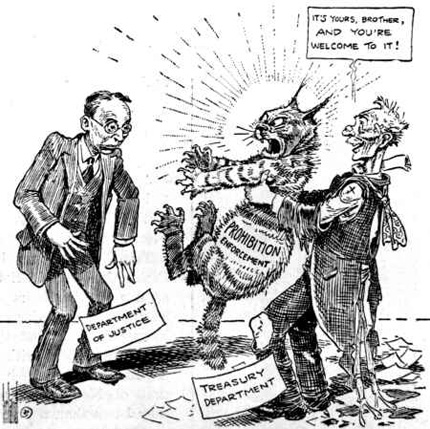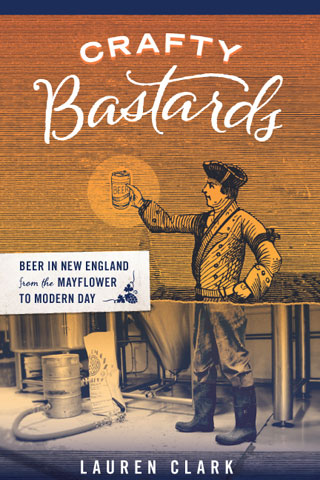March 13th, 2010
Little known facts about Prohibition

Anyone out there know if there’s a good college class on Prohibition? I would sign up for it. There is so much interesting stuff about big-P Prohibition (1919-1933) and various small-P prohibitions that just isn’t part of Americans’ knowledge of history (OK, there’s a lot lacking in Americans’ knowledge of history, but I’ll let another blogger tackle that). I did not know, for instance, until I read The Chemist’s War in Slate that there was a federal program to poison alcohol.
“Frustrated that people continued to consume so much alcohol even after it was banned, federal officials had decided to try a different kind of enforcement. They ordered the poisoning of industrial alcohols manufactured in the United States, products regularly stolen by bootleggers and resold as drinkable spirits. The idea was to scare people into giving up illicit drinking. Instead, by the time Prohibition ended in 1933, the federal poisoning program, by some estimates, had killed at least 10,000 people,” writes Deborah Blum. If it’s even close to being accurate, that number’s astonishing.
Prohibition-era President Calvin Coolidge, who had already, as governor of Massachusetts, made a name for himself by cracking down on striking Boston cops, showed his characteristic zeal for maintaining law and order by turning to “chemistry as an enforcement tool.” Wow, way to go, Silent Cal. Imagine if that sort of zeal was ever applied to enforcing regulations governing high finance… Ah, well. Then as now.
Equally as fascinating as the dark episode above: We think of Massachusetts as a pioneer in everything from establishing the New World to declaring independence from the Old World to letting gay people marry to mandating universal health insurance. But few people know that the Bay State was also a pioneer in prohibition. According to Perry R. Duis’ study The Saloon: Public Drinking in Chicago and Boston, 1880-1920, Massachusetts was the first to enact statewide prohibition, which, except for the years 1868 and 1871-3, lasted from 1852 to 1875. Of course, we had about as much success with our own noble experiment as the entire nation did some decades later. Duis writes:
“The wets claimed that arrests for drunkenness had not really declined as dramatically as citizens had earlier believed. Alcohol was obviously being produced or imported, and a secret distribution system placed it in the hands of thousands of drinkers… Charity workers and city missionaries worried aloud about the social problems that came from… secret consumption. Tenement doors concealed drunkenness, wife beating, and child abuse… Under license, the quality and purity of liquor could be regulated; now, inspection was virtually impossible.”
And on and on. See you in class.
Tags: 1920s, Calvin Coolidge, Massachusetts prohibition, Perry Duis, poison alcohol, Prohibition
Posted in Books & resources | 3 Comments »
